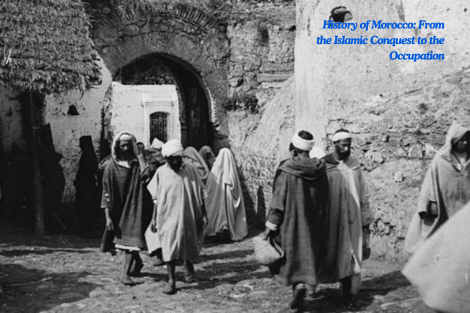History of Morocco: From the Islamic Conquest to the Occupation
After the arrival of Islam, Morocco entered a new phase in its long history. The Berbers welcomed the new faith but maintained a strong political and cultural autonomy. Thus were born the first great indigenous dynasties that transformed the country into a regional power.
The first to emerge were the Idrissids founded by Idris the fugitive from Mecca who found refuge among the Berber tribes of the north. With his arrival, Shiite Islam was consolidated and Fez was founded, which soon became a center of culture and spirituality. Scholars, merchants and poets were trained in its streets, making it one of the most brilliant cities in the Islamic world.
Then came the Almoravids, warriors and mystics from the desert who founded Marrakech and brought their rigorous vision of Islam to Muslim Spain. Under them, Morocco became part of an empire that stretched from Senegal to the Ebro.
After them came the Almohads, radical reformers who united religion and power even more closely. they founded a new Marrakech built imposing mosques and dominated Al Andalus until the unity began to crumble under the pressure of internal rebellions and external threats
With the end of the Almohads, power passed to local and regional dynasties often at war with each other such as the Merinids who brought Fez back to the center of the scene then the Wattasids and finally the Saadians who in the midst of the European Renaissance fought against the Portuguese and the Spanish and even managed to expand their dominion to the heart of the desert defeating the Christian invaders at al Qasr al Kabir
In the meantime, Europe was growing in power and ambition and was looking with interest to Morocco The Portuguese occupied various coastal cities while the Spanish did the same further north The pressure increased and the threat of colonization became increasingly concrete
In the seventeenth century the Alawite dynasty emerged which is still the ruling house of Morocco It unified the country under a central power restored Muslim authority and resisted foreign incursions, keeping Morocco independent during a period in which almost the entire African continent fell under European domination
This independence lasted until the nineteenth century when the European colonial powers began to exert strong economic, political and military pressure. France and Spain divided up the spheres of influence while the United Kingdom played a role as an attentive but influential observer
In the twentieth century, after various diplomatic crises, imposed treaties and popular protests, Morocco became a French protectorate while the north and some areas of the south passed under Spanish control. Even though formally the sultan remained in power, the reality was that of a real occupation. The French modernized the infrastructure but at the cost of freedom and national identity, while revolts such as that of the Rif testified to the will of the Moroccans not to give in
This long occupation, however, did not erase the spirit of the people who continued to fight until they found the path to independence



Leave a comment to help us thanks.